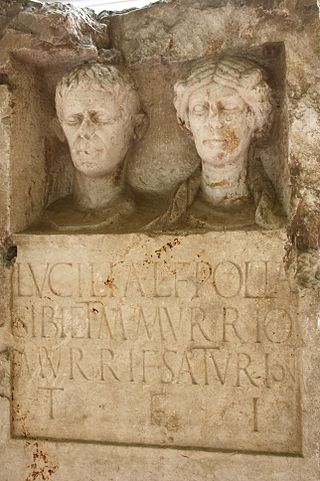Related Research Articles
The gens Acilia was a plebeian family at ancient Rome, that flourished from the middle of the third century BC until at least the fifth century AD, a period of seven hundred years. The first of the gens to achieve prominence was Gaius Acilius, who was quaestor in 203 and tribune of the plebs in 197 BC.

The gens Valeria was a patrician family at ancient Rome, prominent from the very beginning of the Republic to the latest period of the Empire. Publius Valerius Poplicola was one of the consuls in 509 BC, the year that saw the overthrow of the Tarquins, and the members of his family were among the most celebrated statesmen and generals at the beginning of the Republic. Over the next ten centuries, few gentes produced as many distinguished men, and at every period the name of Valerius was constantly to be found in the lists of annual magistrates, and held in the highest honour. Several of the emperors claimed descent from the Valerii, whose name they bore as part of their official nomenclature.
The gens Sulpicia was one of the most ancient patrician families at ancient Rome, and produced a succession of distinguished men, from the foundation of the Republic to the imperial period. The first member of the gens who obtained the consulship was Servius Sulpicius Camerinus Cornutus, in 500 BC, only nine years after the expulsion of the Tarquins, and the last of the name who appears on the consular list was Sextus Sulpicius Tertullus in AD 158. Although originally patrician, the family also possessed plebeian members, some of whom may have been descended from freedmen of the gens.

The gens Lucilia was a plebeian family at ancient Rome. The most famous member of this gens was the poet Gaius Lucilius, who flourished during the latter part of the second century BC. Although many Lucilii appear in Roman history, the only one known to have obtained any of the higher offices of the Roman state was Lucilius Longus, consul suffectus in AD 7.

The gens Fabia was one of the most ancient patrician families at ancient Rome. The gens played a prominent part in history soon after the establishment of the Republic, and three brothers were invested with seven successive consulships, from 485 to 479 BC, thereby cementing the high repute of the family. Overall, the Fabii received 45 consulships during the Republic. The house derived its greatest lustre from the patriotic courage and tragic fate of the 306 Fabii in the Battle of the Cremera, 477 BC. But the Fabii were not distinguished as warriors alone; several members of the gens were also important in the history of Roman literature and the arts.
The gens Papiria was a patrician family at ancient Rome. According to tradition, the Papirii had already achieved prominence in the time of the kings, and the first Rex Sacrorum and Pontifex Maximus of the Republic were members of this gens. Lucius Papirius Mugillanus was the first of the Papirii to obtain the consulship in 444 BC. The patrician members of the family regularly occupied the highest offices of the Roman state down to the time of the Punic Wars. Their most famous member was Lucius Papirius Cursor, five times consul between 326 and 313 BC, who earned three triumphs during the Samnite Wars. Most of the Papirii who held office under the later Republic belonged to various plebeian branches of the family. Although the most illustrious Papirii flourished in the time of the Republic, a number of the family continued to hold high office during the first two centuries of the Empire.

The gens Marcia, occasionally written Martia, was one of the oldest and noblest houses at ancient Rome. They claimed descent from the second and fourth Roman Kings, and the first of the Marcii appearing in the history of the Republic would seem to have been patrician; but all of the families of the Marcii known in the later Republic were plebeian. The first to obtain the consulship was Gaius Marcius Rutilus in 357 BC, only a few years after the passage of the lex Licinia Sextia opened this office to the plebeians.
The gens Terentia was a plebeian family at ancient Rome. Dionysius mentions a Gaius Terentius Arsa, tribune of the plebs in 462 BC, but Livy calls him Terentilius, and from inscriptions this would seem to be a separate gens. No other Terentii appear in history until the time of the Second Punic War. Gaius Terentius Varro, one of the Roman commanders at the Battle of Cannae in 216 BC, was the first to hold the consulship. Members of this family are found as late as the third century AD.

The gens Sempronia was one of the most ancient and noble houses of ancient Rome. Although the oldest branch of this gens was patrician, with Aulus Sempronius Atratinus obtaining the consulship in 497 BC, the thirteenth year of the Republic, but from the time of the Samnite Wars onward, most if not all of the Sempronii appearing in history were plebeians. Although the Sempronii were illustrious under the Republic, few of them attained any importance or notice in imperial times.
The gens Octavia was a plebeian family at ancient Rome, which was raised to patrician status by Caesar during the first century BC. The first member of the gens to achieve prominence was Gnaeus Octavius Rufus, quaestor circa 230 BC. Over the following two centuries, the Octavii held many of the highest offices of the state; but the most celebrated of the family was Gaius Octavius, the grandnephew and adopted son of Caesar, who was proclaimed Augustus by the senate in 27 BC.

The gens Minucia was an ancient Roman family, which flourished from the earliest days of the Republic until imperial times. The gens was apparently of patrician origin, but was better known by its plebeian branches. The first of the Minucii to hold the consulship was Marcus Minucius Augurinus, elected consul in 497 BC.

The gens Mucia was an ancient and noble patrician house at ancient Rome. The gens is first mentioned at the earliest period of the Republic, but in later times the family was known primarily by its plebeian branches.

The gens Antistia, sometimes written Antestia on coins, was a plebeian family at ancient Rome. The first of the gens to achieve prominence was Sextus Antistius, tribune of the plebs in 422 BC.
The gens Cestia was a plebeian family at ancient Rome during the later Republic, and in imperial times. The first member of the gens to obtain the consulship was Gaius Cestius Gallus in AD 35. The family's name is commemorated on two monuments, the Pons Cestius and the Pyramid of Cestius which survive into modern times.
The gens Domitia was a plebeian family at ancient Rome. The first of the gens to achieve prominence was Gnaeus Domitius Calvinus, consul in 332 BC. His son, Gnaeus Domitius Calvinus Maximus, was consul in 283, and the first plebeian censor. The family produced several distinguished generals, and towards the end of the Republic, the Domitii were looked upon as one of the most illustrious gentes.
The gens Magia was a plebeian family at ancient Rome. Members of this gens are first mentioned at the time of the Second Punic War. Although several of them performed useful service to the Roman state, none of the Magii ever held the consulship.
The gens Mummia was a plebeian family at Rome. Members of this gens are first mentioned after the Second Punic War, and within a generation, Lucius Mummius Achaicus became the first of the family to obtain the consulship. Although they were never numerous, Mummii continued to fill the highest offices of the state through the third century AD.

The gens Munatia was a plebeian family at Rome. Members of this gens are first mentioned during the second century BC, but they did not obtain any of the higher offices of the Roman state until imperial times.
The gens Roscia, probably the same as Ruscia, was a plebeian family at ancient Rome. Members of this gens are mentioned as early as the fifth century BC, but after this time they vanish into obscurity until the final century of the Republic. A number of Roscii rose to prominence in imperial times, with some attaining the consulship from the first to the third centuries.
The gens Rupilia, occasionally written Rupillia, was a minor plebeian family at ancient Rome. Members of this gens are first mentioned in the latter part of the Republic, and Publius Rupilius obtained the consulship in 132 BC. Few others achieved any prominence, but the name occurs once or twice in the consular fasti under the Empire. The name is frequently confounded with the similar Rutilius.
References
- 1 2 Dictionary of Greek and Roman Biography and Mythology, vol. II, p. 704 ("Laelia Gens").
- ↑ Chase, p. 110.
- ↑ The New College Latin & English Dictionary, "sapiens".
- ↑ Polybius, x. 3, 9, 18, 19, 37, 39, xi. 24, 32, 33, xiv. 4, 9, xv. 9, 12, 14.
- ↑ Velleius Paterculus, ii. 127.
- ↑ Livy, xxvi. 42, 48, 51, xxvii. 7, 18, xxviii. 17–19, 20, 23, 30, 33, 38, xxix. 1, 4, 6, 24–27, xxx. 3–6, 9, 11–17, 22, 25, 33–35, 40, xxxiii. 24, 26, xxxv. 10, xxvi. 45, xxxvii. 1, 47, 50, xli. 22.
- ↑ Appian, Hispanica, 20, 25, 26, 29; Punica, 26–28, 41, 44.
- ↑ Cicero, Philippicae, xi. 7.
- ↑ Zonaras, ix. 13.
- ↑ Frontinus, Strategemata, i. 1. § 3, i. 2. §. 1, ii. 3. § 16.
- ↑ Velleius Paterculus, ii. 127.
- ↑ Valerius Maximus, iv. 7. § 7.
- ↑ Cicero, Laelius sive de Amicitia, 8, 11, 25; Brutus, 21, 22, 24, 43; Tusculanae Quaestiones, iv. 3, v. 19; De Officiis, i. 26, 30, ii. 11; De Finibus, ii. 8; Epistulae ad Atticum, vii. 3; Philippicae, ii. 33, De Natura Deorum, iii. 2, 17; De Oratore, ii. 6, 7, iii. 7. § 28; De Republica, i. 39; vi. 2; Topica, 20. § 78.
- ↑ Plutarch, Regum et Imperatorium Apophthegmata, p. 200; "The Life of Tiberius Gracchus", 8.
- ↑ Suetonius, "The Life of Terentius", 2.
- ↑ Horace, Satirae, ii. 1, 65–74.
- ↑ Livy, Epitome, lix.
- ↑ Seneca the Younger, Epistulae 11, 104; Naturales Quaestiones, vi. 32.
- ↑ Aulus Gellius, vii. 14.
- ↑ Cicero, Brutus, 58. § 111, De Oratore, iii. 12. § 44.
- ↑ Cicero, Brutus, 26. § 101.
- ↑ Scholia Bobiensa, Pro Flacco, p. 235 (ed. Orelli).
- ↑ Frontinus, Strategemata, ii. 5. § 31.
- ↑ Obsequens, 119.
- ↑ Cicero, De Oratore, ii. 6.
- ↑ Cicero, Pro Flacco, 1. 6; Epistulae ad Atticum, 11, n. 12. A., xi. 7, 14.
- ↑ Scholia Bobiensa, Pro Flacco, p. 228 (ed. Orelli).
- ↑ Caesar, The Civil War, iii. 5, 40, 100.
- ↑ Broughton, vol. II, pp. 361, 362.
- ↑ Shackleton-Bailey, Cicero: Letters to Atticus, vol. 4, p. 344.
- ↑ Fasti Capitolini.
- ↑ Cassius Dio, lv. 9.
- ↑ Tacitus, Annales, vi. 47, 48.
- ↑ Fasti Teanenses, AE 1905, 192; 1909, 78; 1939, 172; 2008, 385.
- ↑ Gallivan, "The Fasti for the Reign of Claudius", pp. 408, 414, 425.
- ↑ Tacitus, Annales, xv. 22.
- ↑ Dictionary of Greek and Roman Biography and Mythology, vol. II, p. 143 ("Laelius Felix").